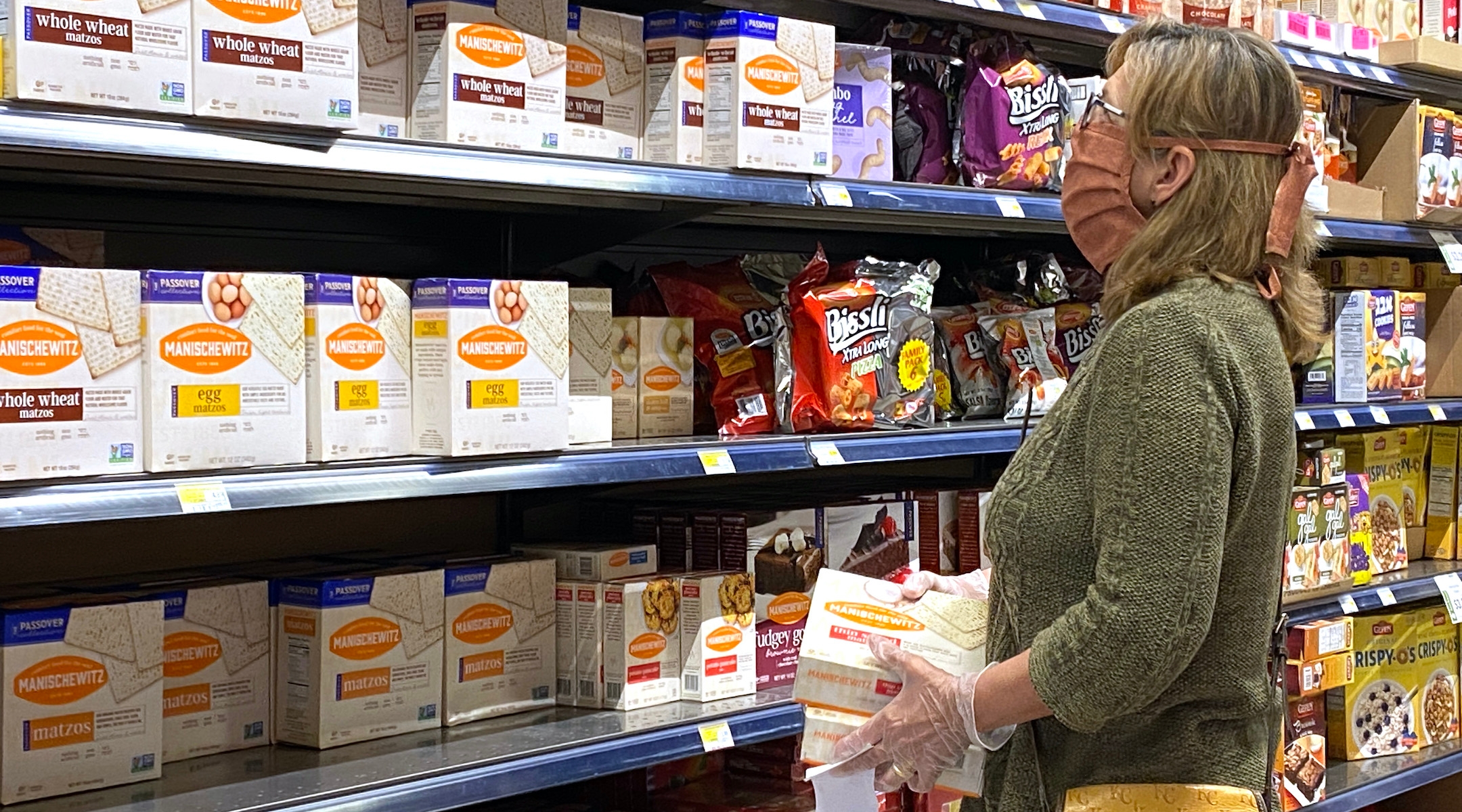(JTA) — Ahead of Passover, Hannah Lebovits’ local kosher store is usually bustling, its tight aisles packed with people shopping for matzah meal and macaroons while kibitzing in the aisles. She typically comes in knowing the exact ingredients she will need for a scrumptious Seder.
“There’s an excitement to it. There’s a sense of you’re going to the store, you’re getting the things you need,” said the 27-year-old, who lives with her husband and two kids in University Heights, a Cleveland suburb. “You have these grand ideas in your mind, and there’s a certain energy around shopping.”
But this year, there were uncharacteristically few customers at the market, Unger’s in nearby Cleveland Heights, and the shoppers were quiet. Amid the coronavirus outbreak, the kosher store and bakery was letting in only five people at a time to minimize the risk of COVID-19 transmission. Most came to buy their things and left without socializing.
“It’s an eerie sort of calm,” recalled Lebovits, a doctoral student at Cleveland State University and freelance journalist.
The period leading up to Passover, the eight-day holiday commemorating the Jews’ exodus from Egypt, is usually one of the busiest times of the year for kosher grocery stores. Those who observe the holiday strictly, like Lebovits, scrupulously clean their kitchens and stock up on products that are certified kosher for Passover. Seder dinners are social affairs, and their hosts buy large quantities of food to feed guests.
But amid the coronavirus pandemic, most people are not hosting large Seders and fear that a trip to the grocery store could expose them to the deadly virus. At Seasons Scarsdale, a kosher store in New York’s suburban Westchester County, “there’s a lot of anxiety,” General Manager David Gellman said.
“Customers are coming in all wearing masks and face shields. You can’t even really see who people are,” he said.
The chain has taken a number of precautions in its six New York and New Jersey locations to limit the risk of disease transmission, including allowing only one person per family to enter and limiting the total number of customers to 40. Customers are receiving gloves and wipes upon entering.
Other kosher stores are taking a number of measures to prevent disease transmission, including taking customers’ temperatures at the entrance, installing Plexiglas dividers at checkout counters and extending hours past midnight to avoid crowding.
Still, Gellman said, many customers are opting for curbside pickup and delivery. Assembling those orders makes them more labor intensive for staff, and Seasons Scarsdale has had to hire additional workers and extend their hours.
Some kosher stores that offer catering report losing significant income as communal seders have been canceled.
That’s the case at Aroma Market & Catering, a South Florida establishment with locations in Boca Raton and Cooper City.
“We have always had a very strong Passover program where people would go to the hotels during the Passover holiday, and we would cater the entire event,” Lori Janow, the catering manager for the store’s Boca outpost, told the South Florida Sun Sentinel. “We have had multiple programs, aside from having very large temples we cater to. All of the gatherings that we had planned, we’ve lost because nobody can gather in groups.”
Even those who do feel comfortable shopping in stores are limiting their trips.
Rabbi David Bashevkin’s family took only two or three trips to their local kosher market to stock up for Passover, as opposed to the more typical 10 ahead of the holiday. They wanted to minimize potential exposure to COVID-19 in their hometown of Teaneck, New Jersey, which has been particularly hard hit by the pandemic.
To avoid additional trips Bashevkin, the director of education for the Orthodox youth movement NCSY, got kosher-for-Passover supplies from his parents, who had stocked up ahead of time. Friends have been pitching in, too — neighbors recently dropped off oil and kosher-for-Passover croutons outside his house after the family realized they didn’t have any.
“The grocery store might be the center of shopping, but people have found other pipelines and entryways to disseminate it,” said Bashevkin, 35. “So it’s not just every person taking a shopping cart up and down aisle 7, it’s one person going down aisles 1, 2, 3, 4, 5, 6 and 7, and taking it and putting it on a porch over here, on a porch over there.”
Though the pandemic has provided many challenges, Bashevkin said that members of his community have been rising to the occasion, communicating through WhatsApp to make sure everyone has what they need.
“We’re more distant [physically],” he said, “but we’ve become even closer, like family.”
JTA has documented Jewish history in real-time for over a century. Keep our journalism strong by joining us in supporting independent, award-winning reporting.






